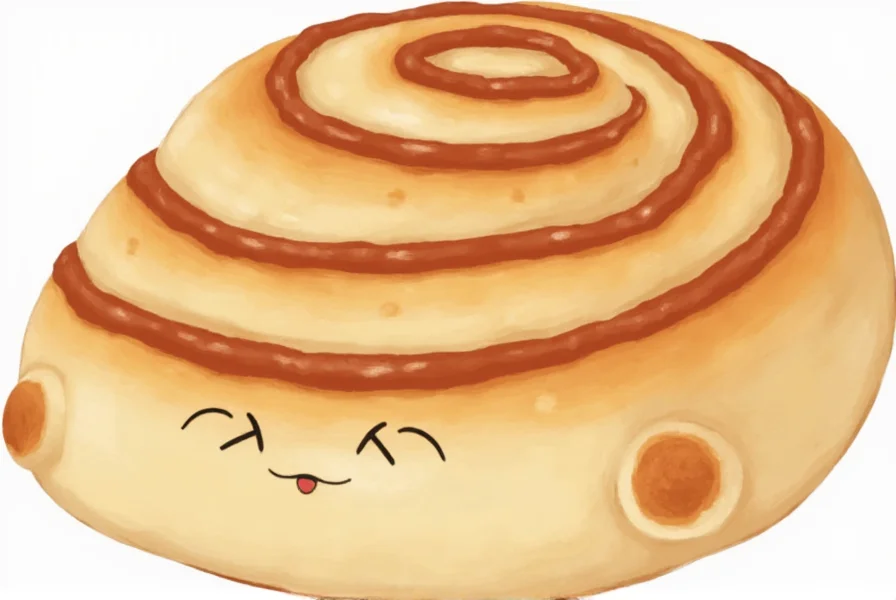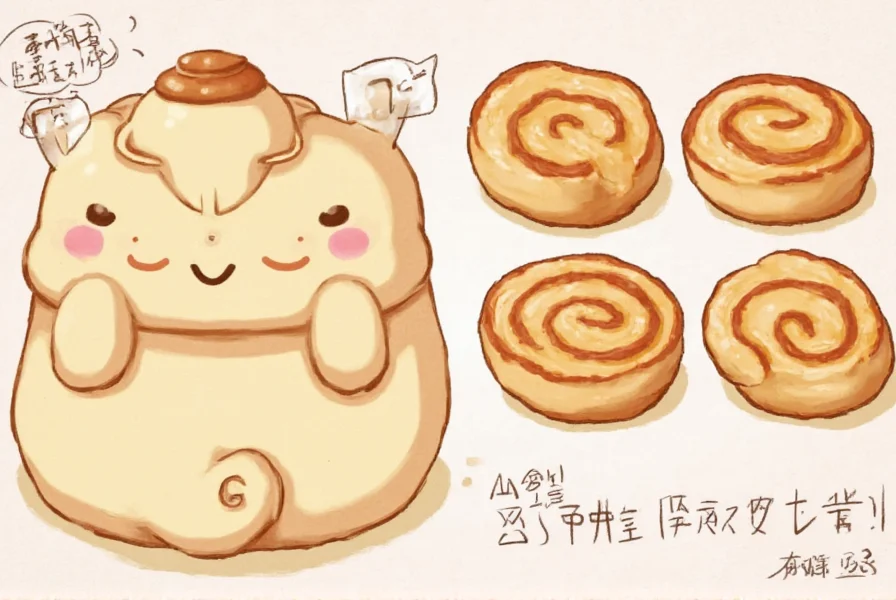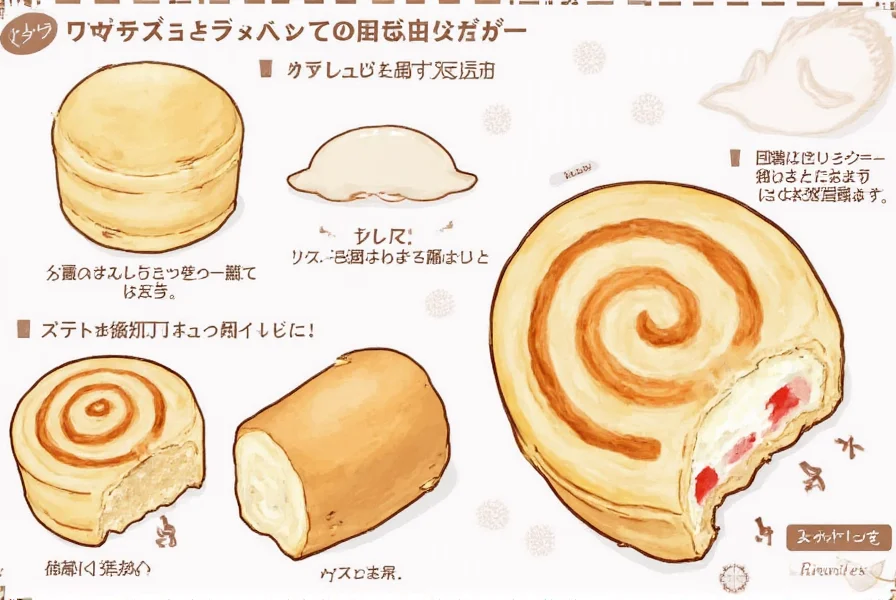The kawaii cinnamon roll is a Japanese-inspired adaptation of the traditional American pastry, featuring cute decorative elements like animal shapes, character faces, and colorful swirls that transform ordinary cinnamon rolls into visually appealing treats. These creative pastries combine authentic cinnamon roll flavors with kawaii (Japanese for 'cute') aesthetics through specialized shaping techniques, food coloring, and decorative toppings that maintain the soft, sweet, and spicy characteristics of classic cinnamon rolls while adding visual delight.
Originating from Japan's pervasive kawaii culture, these adorable pastries have gained international popularity through social media platforms like Instagram and Pinterest. Unlike standard cinnamon rolls that focus primarily on flavor, kawaii versions prioritize visual presentation without compromising on taste. The key difference lies in the creative shaping techniques applied during the preparation process, turning simple swirls of dough into charming characters, animals, or themed designs that appeal to both children and adults.
What Defines Kawaii Cinnamon Roll Aesthetics
Kawaii food art follows specific visual principles that distinguish it from regular pastry decoration. Authentic kawaii cinnamon rolls feature:
- Exaggerated proportions - oversized eyes or features relative to the roll size
- Soft color palettes - pastel frostings and natural food colorings rather than bright artificial hues
- Simple facial expressions - minimal line work creating happy, surprised, or sleepy expressions
- Themed presentations - seasonal motifs like cherry blossoms or holiday elements
- Textural contrast - smooth icing against the textured bun surface
These elements transform ordinary cinnamon rolls into conversation pieces while maintaining the essential flavor profile that makes cinnamon rolls beloved worldwide. The most successful kawaii adaptations preserve the gooey center and flaky layers that characterize quality cinnamon rolls.
| Feature | Traditional Cinnamon Roll | Kawaii Cinnamon Roll |
|---|---|---|
| Primary Focus | Flavor intensity | Visual presentation + flavor |
| Shaping Technique | Simple spiral | Character shapes, animal forms |
| Frosting Application | Even drizzle or spread | Strategic placement for facial features |
| Color Palette | Natural tones | Soft pastels with intentional accents |
| Preparation Time | 2-3 hours | 3-4 hours (with decoration time) |
Cultural Roots of Kawaii Food Presentation
The kawaii movement emerged in Japan during the 1970s and has since evolved into a significant cultural phenomenon influencing fashion, product design, and culinary arts. When applied to baking, kawaii principles transform ordinary foods into charming creations that evoke positive emotional responses. Food anthropologists note that kawaii cuisine serves multiple purposes: making meals more enjoyable, encouraging consumption (particularly among children), and creating shareable moments on social media.
Unlike American 'funfetti' or cartoon-themed foods that often prioritize novelty over aesthetics, authentic kawaii food maintains culinary integrity while adding visual delight. This philosophy explains why kawaii cinnamon rolls have gained traction among professional bakers—they represent a sophisticated approach to food presentation that enhances rather than overshadows the eating experience.
Essential Techniques for Creating Authentic Kawaii Cinnamon Rolls
Transforming standard cinnamon rolls into kawaii creations requires specific techniques that go beyond basic pastry skills. Professional bakers recommend these approaches for achieving genuine kawaii aesthetics:
Strategic Dough Shaping
The foundation of kawaii cinnamon rolls lies in how you shape the dough before baking. Instead of rolling the dough into a single cylinder, divide it into smaller portions that can be arranged into recognizable shapes. For animal faces, create small balls for the main body and use thin strips for ears or features. The key is maintaining consistent thickness so all parts bake evenly.
Color Application Methods
When incorporating color for kawaii effects, use natural food colorings mixed with cream cheese frosting rather than artificial dyes. Professional pastry chefs recommend these ratios for soft pastel shades:
- For blush effects: 1 teaspoon beet powder per cup of frosting
- For pastel blue: 1/2 teaspoon spirulina powder per cup
- For soft pink: 1 teaspoon raspberry powder per cup
- For yellow accents: pinch of turmeric per cup
Apply colors sparingly using toothpicks or fine-tipped piping bags to create delicate features rather than bold patterns.

Recipe Adaptation Tips for Kawaii Cinnamon Rolls
Converting your favorite cinnamon roll recipe into a kawaii version requires thoughtful modifications. These professional baking tips ensure your cute creations maintain structural integrity and flavor balance:
- Reduce sugar content slightly - The visual appeal allows for slightly less sweetness while maintaining perceived deliciousness
- Increase dough elasticity - Add 1-2 tablespoons of vital wheat gluten to standard recipes for better shaping capabilities
- Control filling distribution - Use less filling in areas designated for facial features to prevent bleeding during baking
- Adjust baking time - Smaller shaped components may require 2-3 minutes less baking time than standard rolls
- Temperature management - Keep dough chilled during shaping to maintain defined edges
These adaptations preserve the essential cinnamon roll experience while enabling creative presentation. The most successful kawaii cinnamon roll recipes balance visual innovation with respect for the traditional pastry's core characteristics.
Avoiding Common Kawaii Cinnamon Roll Mistakes
Many home bakers encounter challenges when attempting kawaii cinnamon rolls for the first time. Professional pastry chefs identify these frequent errors and their solutions:
- Overcomplicated designs - Start with simple expressions (happy face, sleepy eyes) before attempting detailed characters
- Excessive moisture - Too much filling causes designs to blur; use thickened fruit preserves instead of liquidy sauces
- Inconsistent sizing - Use a kitchen scale to portion dough for uniform baking
- Artificial coloring overload - Authentic kawaii uses subtle color accents, not neon hues
- Rushing the cooling process - Allow complete cooling before adding detailed decorations
Remember that the essence of kawaii is simplicity and charm, not complexity. The most effective kawaii cinnamon rolls often feature minimal decoration that highlights the natural beauty of the pastry.

Serving and Storage Recommendations
Kawaii cinnamon rolls require special handling to maintain their visual appeal. For optimal presentation:
- Serve on plain white plates to highlight the decorative elements
- Display at room temperature rather than warm, as heat causes frosting details to melt
- Store decorated rolls in airtight containers with parchment between layers
- Freeze undecorated shaped rolls, then bake and decorate fresh
- Avoid refrigeration, which dries out the pastry and dulls colors
For events or gatherings, prepare the shaped but unbaked rolls in advance, freeze them on baking sheets, then transfer to airtight containers. When ready to serve, bake directly from frozen (adding 5-7 minutes to baking time) and decorate while cooling.
Conclusion
Kawaii cinnamon rolls represent a delightful fusion of Japanese aesthetic principles and Western baking traditions. By focusing on simple, charming designs that enhance rather than overwhelm the classic cinnamon roll experience, these creative pastries offer both visual delight and delicious flavor. The key to successful kawaii cinnamon rolls lies in balancing artistic presentation with baking fundamentals—maintaining proper dough consistency, controlled filling distribution, and thoughtful color application. Whether you're a professional baker or home enthusiast, incorporating these techniques will transform your cinnamon rolls into adorable, Instagram-worthy treats that delight both the eyes and the palate.
Frequently Asked Questions
What's the difference between regular and kawaii cinnamon rolls?
Kawaii cinnamon rolls maintain the same delicious flavor profile as traditional versions but incorporate Japanese-inspired cute aesthetics through specialized shaping techniques, strategic frosting application for facial features, and soft color accents. The primary difference is visual presentation while preserving the essential cinnamon roll characteristics of soft dough, sweet-spicy filling, and creamy frosting.
Can I make kawaii cinnamon rolls with store-bought dough?
Yes, refrigerated cinnamon roll dough works well for kawaii adaptations. The key is working quickly while the dough is cold to maintain shape integrity. Cut the pre-portioned rolls into smaller pieces for shaping animal faces or characters, and use the included frosting for basic features. For best results, slightly reduce the included frosting quantity and supplement with additional cream cheese frosting for more detailed decorations.
How do I prevent my kawaii designs from melting during baking?
To maintain kawaii designs during baking, use less filling in areas designated for facial features, keep dough portions consistently sized, and slightly reduce baking time. The most critical factor is controlling moisture—thicken fruit preserves with cornstarch if using them in designs, and avoid liquidy fillings in detailed areas. Professional bakers recommend chilling shaped rolls for 15 minutes before baking to help maintain their form.
What are the easiest kawaii designs for beginners to try?
Beginners should start with simple animal faces like cats, bears, or bunnies using basic shapes. A classic approach is creating 'sleepy face' rolls with two small oval frosting pieces for closed eyes and a curved line for a content smile. Another easy design is the 'blushing bear' featuring two small frosting circles for cheeks and tiny dots for eyes. These require minimal piping skills while delivering authentic kawaii charm.
Do kawaii cinnamon rolls taste different from regular ones?
When properly executed, kawaii cinnamon rolls taste identical to traditional versions. The visual modifications shouldn't affect flavor—professional bakers actually recommend slightly reducing sugar content since the visual appeal enhances perceived sweetness. The key is maintaining the proper dough-to-filling ratio and using the same quality ingredients, with decorative elements added after baking to preserve the classic cinnamon roll taste experience.











 浙公网安备
33010002000092号
浙公网安备
33010002000092号 浙B2-20120091-4
浙B2-20120091-4